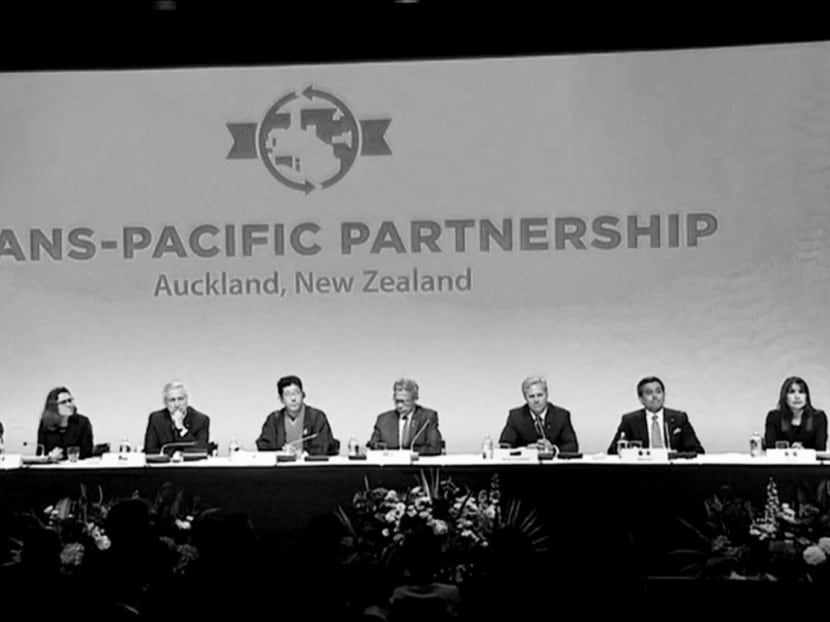Final plea for the TPP
Six United States Ambassadors took the unusual step last week of sending an open letter to the US Congress asking its members to support the Trans Pacific Partnership (TPP) trade pact. Incoming President Donald Trump has vowed to kill the 12-nation pact, which is pending ratification by the member states. The ambassadors warn that walking away from the TPP may be seen by future generations as the moment America chose to cede leadership in Asia-Pacific to others. “Such an outcome would be cause for celebration among those who favour ‘Asia for the Asians’ and state capitalism,” it added in a passage indirectly criticising Chinese President Xi Jinping, who has said that Asia should be run by Asians. Below is the text of the letter:

Trade ministers and officials from the 12 TPP member nations at the signing ceremony in New Zealand on Feb 4 last year. In an open letter to the US Congress, six US ambassadors warn that walking away from the TPP may be seen by future generations as the moment America chose to cede leadership in Asia-Pacific to others. Photo: REUTERS
Six United States Ambassadors took the unusual step last week of sending an open letter to the US Congress asking its members to support the Trans Pacific Partnership (TPP) trade pact. Incoming President Donald Trump has vowed to kill the 12-nation pact, which is pending ratification by the member states. The ambassadors warn that walking away from the TPP may be seen by future generations as the moment America chose to cede leadership in Asia-Pacific to others. “Such an outcome would be cause for celebration among those who favour ‘Asia for the Asians’ and state capitalism,” it added in a passage indirectly criticising Chinese President Xi Jinping, who has said that Asia should be run by Asians. Below is the text of the letter:
Seventy-five years ago last month, an attack on the United States set us on the path to becoming the Asia-Pacific power we are today. As US Ambassadors assigned to the region, we interact daily with governmental, business, and civil society leaders who appreciate profoundly the role the US has played in underpinning the region’s security and prosperity ever since. These same leaders are now asking an alarming question: Will we relinquish our mantle as the pre-eminent force for good in the planet’s most dynamic region? The cause for their concern — possible US withdrawal from the Trans-Pacific Partnership (TPP). We believe their fears are justified, that walking away from the TPP may be seen by future generations as the moment America chose to cede leadership to others in this part of the world and accept a diminished role. Such an outcome would be cause for celebration among those who favour “Asia for the Asians” and state capitalism. It would be disastrous for supporters of inclusive politics, rule of law, and market economics — and for US national interests.
Let us be clear. The alternative to a TPP world is not the status quo. Others are actively engaged in setting the rules of commerce in the Asia-Pacific region without the US. In addition to its massive Eurasian infrastructure initiative, China is working on a trade pact called the Regional Comprehensive Economic Partnership (RCEP) with 15 other countries, many of whom are TPP signatories. RCEP is a much lower-standard agreement that, in the absence of the TPP, would likely serve as the template for economic integration in Asia and shift trade away from America, which would face higher tariffs. That would mean less US exports and more jobs moving overseas.
The TPP would not just cut tariffs for US products. Unlike RCEP, it would compel stronger intellectual property rights, limits on subsidies to state-owned enterprises, and protection of worker rights, the environment, and a free and open Internet. These enforceable commitments would give a leg up to US companies already adhering to high standards — and the US workers who make them the most productive in the world — and provide a powerful lever for change we are unlikely to replicate in any other form in the near future. Without them, our companies will face even more competitive disadvantages in Asia’s booming markets.
The blow to our strategic position is even more worrisome. This is not speculation. To turn our back on our allies and friends at this critical juncture, when the tectonic plates of regional power are shifting faster than ever, would undermine our credibility not only as a reliable trade partner, but as a leader on both sides of the Pacific. It would also create a potentially destabilising void that might even lead to conflict, an outcome which would hurt everyone in the region, including China.
The bottom line is this: The TPP is good for American workers, American values, and American strategic interests. We urge the Congress to work with the new administration to find a way to realise its many benefits before the window for doing so closes.
As we reflect on more than seven decades of US sacrifice and stewardship in the region, that will define our destiny in coming decades, we should understand that, if we fail to answer today’s call, history will pose a stern question — why did America forsake its best chance to shape the Pacific Century?
Signed by: Max Baucus, ambassador to China; Nina Hachigian, ambassador to the Association of South-east Asian Nations; Caroline Kennedy, ambassador to Japan; Mark Lippert, ambassador to South Korea; Mark Gilbert, ambassador to New Zealand and Samoa; and Kirk Wagar, ambassador to Singapore.






